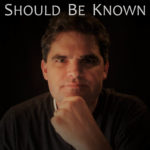
Well the text below isn’t super close to the words I actually uttered forth in my podcast, but here they are anyway. Enjoy and thanks for listening/reading!
Monday, May 20, 2022
Offense a Conscious Choice?
More on the idea that it’s not totally accurate to say that getting offended or getting angry is a conscious choice. (Or getting anxious or …)
Friday, June 2, 2022
Insight vs. New Information and Logic
So I’m thinking about insight versus kind of actual new information, or might we say, conclusions or whatever. So what is insight? To me you get an insight just purely from thinking about something. It’s an observation. Maybe that’s a better concept, an insight is an observation. Then in the theoretical world, and really the world in general, you make an insight into an assumption or something, you use that insight to explain the world. And so all these theories develop that are based on one idea and one idea only. Evolution, for example. Or behavioral theory. Or brain chemicals, or sunlight, or cognitive theory,…. And of course none of these theories explains everything well on their own. In fact, even together they don’t necessarily explain things that great. Maybe I’m just biased because I know that the principle of self deception isn’t in there. But anyway none of them explain everything, and that includes the theory of self deception. It doesn’t explain everything by itself. These are all parts of the machinery, right? All parts of the mechanism that work together to influence us to do what we do.
Anyway what is the difference between an insight, and observation, an assumption, a conclusion, and anything in between? Maybe you can make anything into an assumption, or maybe to use a better word, you can take any idea and, assuming it to be true, reason from there. That idea may be right and it may be wrong. But you can reason from it all the same, just like you can do math using one number or another, you’ll just get an erroneous result if you start out using the wrong number or the wrong idea.
I wouldn’t mind strengthening my ability to do logic. I wonder how I would do that? I’m sure there are books on it and maybe even YouTube videos. My minor in logic was a good primer, and the logic I used to program stuff for work is good training, and other reasoning in life all helps.
I have the idea that Socrates loved to use words and phrases and statements in logic and go in a very step-by-step fashion through it to say what he wanted to say or make the point he wanted to make. But I feel like he changed the meaning of words or phrases in the middle of the process somehow to get people to agree to stuff that they didn’t really think based on statements they would agree to. Something like that. Isn’t that cold sophistry? Or maybe that Sophocles did that and that’s why they call it sophistry. But I feel like Socrates did that too, kind of twisting stuff to his own benefit sometimes. But he was right a lot of the time too.
Listing Psychological Principles
I’m also wondering about making a big list of psychological principles.
Thursday, June 9, 2022
Moral Accountability for Self-Deception and Choices
Just a little thought to tack onto the discussion (is it written down or did I just say it in my podcast?), The discussion on the thought that if we are not held morally accountable for all of our self deception. I started trying to say, as I was doing my podcast, how mental illness probably isn’t in the category of stuff that we’re morally accountable for. But I was starting to wander into an area that I unsure about, so I stopped, and even erased what I started in the podcast. But my additional thought about that is that we don’t experience life as a continual stream of choice or whatever before us. That’s how I’ve heard it described by some philosophers I guess I’ll say. We experiences, I mean we experience choices. They’re more discrete and isolated. They’re not continual. Can you imagine how exhausting it would be to be making significant moral decisions at every moment? What does that even mean? What kind of a concept is that?
It’s like the philosopher who made the riddle about shooting an arrow and it never being able to reach the target, because every time it got to half way there you could divide the remaining distance in half, and then when it got to that half you would divide the remaining distance in half, and so on ad infinitum, and so how could an arrow ever travel an infinity of distances? It’s like that. Of course we know the arrow gets there just fine. So something is wrong with the concept of an Infiniti of possibly infinitesimally small distances rather than with the arrow. And the target.
Friday, June 17, 2022
Funny how division works (referring to the above discussion) 🙂
So if you divide something by infinity, and then multiply the result by infinity, do you get that same number you started out with? 🙂 What is the result, anyway, of that first division?
——
Jane Clayson on Depression and Power Over Emotions
“So I guess that’s the difference for me is when I’m discouraged I’m a free agent of my emotions, and when I was clinically depressed I feel like I certainly wasn’t.”
-Jane Clayson
In ‘All In‘ podcast, 13:25
She couldn’t feel the Spirit when she was depressed.
What of the idea, expressed by that one lady who wrote the article I didn’t love about mental health and the Church, that we all have the ability to cease from sin–unless we’re mentally ill?